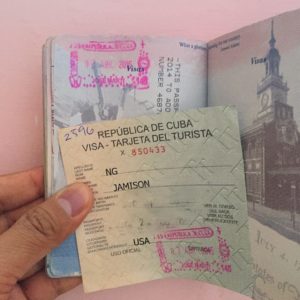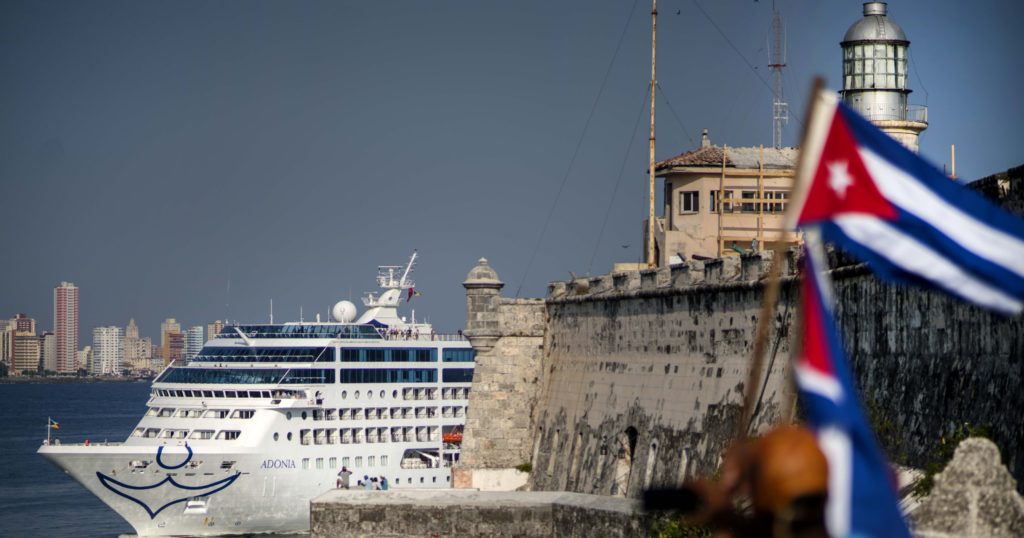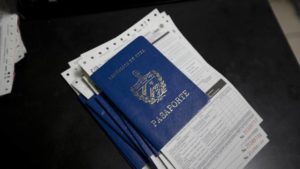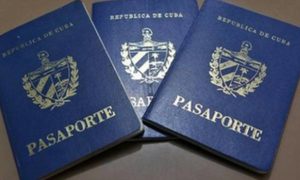 WILL CONTINUE OBLIGATION OF CUBAN PASSPORT REQUIREMENT TO VISITORS TO THE ISLAND.
WILL CONTINUE OBLIGATION OF CUBAN PASSPORT REQUIREMENT TO VISITORS TO THE ISLAND.
The norm that requires those born in Cuba to obtain a Cuban passport to travel to the island, even if they are citizens of other countries, should not change with the constitutional reform that will take place soon, said Cuban Ambassador José Ramón Cabañas at an event in Washington. this Monday and said. “I do not expect any change in that sense.”
“The principle by which we rule is that every Cuban – and may have a second or third citizenship, when he returns to Cuba, on the island, in our borders is Cuban,” he explained in English to attendees at an event on projects of environmental collaboration and historical conservation between the United States and Cuba, organized by the Center for International Policy and Ocean Doctor.
This regulation affects the majority of Cuban-Americans who travel to the island every year to visit their relatives and its elimination has been one of the main demands for years, due to the high cost of the passport (about $ 450, with shipping included). ), which must be extended every two years (at an additional cost of $ 160). Cabañas highlighted the elimination of other obstacles, such as the entry permit known as “habilitation” of the passport, and other measures that have facilitated trips to the island. According to the ambassador, most Cuban-Americans “have or have requested” a Cuban passport.
Raúl Castro, the former governor and still first secretary of the Communist Party, was elected to chair the commission of deputies that will draft the new constitution, which will take a referendum. The new Cuban leader, Miguel Diaz-Canel, ruled out that the reform would introduce significant changes in the political sphere because it will maintain the “irrevocability” of socialism and the Communist Party as “vanguard political force” in the country.
Cabañas also assured that no changes should be expected in how the government of Diaz-Canel faces relations with the United States.
“Many people have expectations … and ask how many things are going to change in terms of relations with the United States,” said Cabañas.
“No one should expect dramatic changes in the way we develop our relationship with the United States because it is based on history and principles.”
At the same time, the ambassador said that “there is still the possibility of maintaining the type of relationship we have built. The neighborhood leads us to cooperate, “said Cabañas.
He also noted that the Office of Foreign Assets Control of the Treasury Department has continued to grant licenses to companies doing business in Cuba, despite the political climate has been rarefied between the two countries with the arrival of Donald Trump to the White House .
The Cuban diplomat avoided speaking directly about President Trump and his new policy toward Cuba – much more aggressive on a rhetorical level – but stressed that his government did not fear temporarily freezing relations.
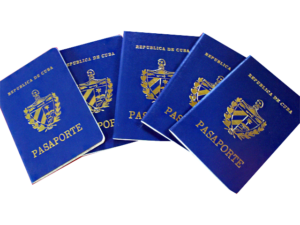 CONTINUARÁ OBLIGACIÓN DEL REQUISITO DE PASAPORTE CUBANO A VISITANTES A LA ISLA.
CONTINUARÁ OBLIGACIÓN DEL REQUISITO DE PASAPORTE CUBANO A VISITANTES A LA ISLA.
La norma que exige a los nacidos en Cuba obtener un pasaporte cubano para viajar a la isla, aunque sean ciudadanos de otros países, no debe cambiar con la reforma constitucional que tendrá lugar próximamente, dijo el embajador cubano José Ramón Cabañas en un evento en Washington este lunes y dijo. “No espero ningún cambio en ese sentido”.
“El principio por el que nos regimos es que todo cubano —y puede tener una segunda o tercera ciudadanía, cuando vuelve a Cuba, en la isla, en nuestra fronteras es cubano”, explicó en inglés a los asistentes a un evento sobre proyectos de colaboración medioambiental y conservación histórica entre Estados Unidos y Cuba, organizado por el Center for International Policy y Ocean Doctor.
Esta regulación afecta a la mayoría de los cubanoamericanos que viajan todos los años a la isla a visitar a sus familiares y su eliminación ha sido una de las principales exigencias durante años, por el alto costo del pasaporte (unos $450, con gastos de envío incluidos), que debe ser prorrogado cada dos años (a un costo adicional de $160). Cabañas destacó la eliminación de otras trabas, como el permiso de entrada conocido como “habilitación” del pasaporte, y otras medidas que han facilitado los viajes a la isla. Según el embajador, la mayoría de los cubanoamericanos “tienen o han solicitado” un pasaporte cubano.
Raúl Castro, el ex gobernante y todavía primer secretario del Partido Comunista, fue elegido para presidir la comisión de diputados que elaborará el borrador de la nueva constitución, que se llevará a un referendo. El nuevo mandatario cubano, Miguel Díaz-Canel, descartó que la reforma introdujera cambios significativos en la esfera política pues mantendrá “la irrevocabilidad” del socialismo y al Partido Comunista como “fuerza política de vanguardia” en el país.
Cabañas también aseguró que no deben esperarse cambios en cómo el gobierno de Díaz-Canel encara las relaciones con Estados Unidos.
“Mucha gente tiene expectativas… y pregunta cuántas cosas van a cambiar en cuanto a las relaciones con Estados Unidos”, dijo Cabañas.
“Nadie debe esperar cambios dramáticos en el modo en que desarrollamos nuestra relación con Estados Unidos porque se basa en la historia y los principios”.
Al mismo tiempo, el embajador dijo que “aún existe la posibilidad de mantener el tipo de relación que hemos construido. La vecindad nos lleva a cooperar”, dijo Cabañas.
Asimismo, destacó que la Oficina de Control de Activos Extranjeros del Departamento del Tesoro ha continuado otorgando licencias a compañías que hacen negocios en Cuba, pese a que el clima político se ha enrarecido entre los dos países con la llegada de Donald Trump a la Casa Blanca.
El diplomático cubano evitó hablar directamente sobre el presidente Trump y su nueva política hacia Cuba —mucho más agresiva a nivel retórico—, pero subrayó que su gobierno no temía congelar temporalmente las relaciones.
Agencies/THeHerald/Nora Gámez/ Extractos/Internet PHotos/ Arnoldo Varona/ TheCubanHistory.com
THE CUBAN HISTORY, HOLLYWOOD.



